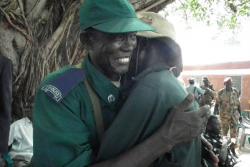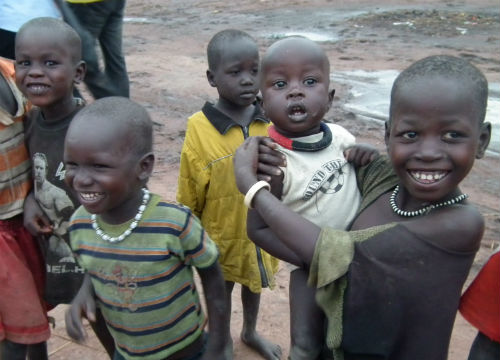Peacekeeping in Action: Bringing Together Two Communities in South Sudan
By Tiffany Easthom, South Sudan Country Director
 Violence breaks out every day during the dry season in Greater Mundri, home of our first field site in South Sudan. Usually the violence is relatively contained and short-lived, as the conflicting Mvolo and Yirol West communities have a history of peaceful coexistence, including shared schooling, health care facilities, and intermarriages.
Violence breaks out every day during the dry season in Greater Mundri, home of our first field site in South Sudan. Usually the violence is relatively contained and short-lived, as the conflicting Mvolo and Yirol West communities have a history of peaceful coexistence, including shared schooling, health care facilities, and intermarriages.
But 2011 was different. Fighting started abruptly on February 9 after a youth was killed while traveling through Mvolo. Youth from both sides moved along the borders and violently attacked communities on the other side.
In South Sudan, a country that has been at war for the past 50 years, violence is often the reflexive response to any type of conflict.
The violence this year was more brutal and further reaching than it had been since the end of Sudan’s civil war in 2005. In just two months, 6,000 homes were burned down, 76,000 people were displaced, dozens of civilians including children were killed or injured, and hundreds of cattle were raided.
As the only civilian protection agency working in the area, Nonviolent Peaceforce got involved in the early days of this conflict. We protected people affected by the fighting and supported the development of a peace agreement.
We were the first to find many of the civilians who were displaced when the first fighting broke out -- groups of primarily women and children who had been hiding in the bush without food or water for days. We linked humanitarian service providers with these displaced people.
 Our teams on the ground gathered information, checked facts, analyzed the situation, reached out to local partners, and developed a strategy. The communication network in South Sudan is severely limited, so the team had to travel in person to the villages to gather information. The roads in South Sudan are atrocious, severely limiting access to communities; it can take 4 hours to travel 30 miles.
Our teams on the ground gathered information, checked facts, analyzed the situation, reached out to local partners, and developed a strategy. The communication network in South Sudan is severely limited, so the team had to travel in person to the villages to gather information. The roads in South Sudan are atrocious, severely limiting access to communities; it can take 4 hours to travel 30 miles.
An essential piece of our work is developing relationships on both sides of the conflict. At the beginning of May, our teams learned that the chiefs from the conflicting communities – Mvolo and Yirol West – wanted to meet about the conflict. They had scheduled similar meetings before, but they always fell through because the chiefs were afraid to travel to each other’s side of the border to meet.
Nonviolent Peaceforce coordinated with local organizations to arrange peace talks and accompanied chiefs and local leaders to meet. This was the first time since the start of the conflict in February that chiefs crossed the border from one side to the other.
The dialogue was remarkably successful. Peace and freedom of movement were officially declared between the two communities. Despite this progress, more dialogue was necessary. In order for the peace talks to be sustainable and effective, the chiefs of the other affected areas needed to participate and buy into the peace agreements.
Our teams organized and accompanied a convoy of four vehicles to carry more chiefs, elders, and youth to the second round of peace talks. The talks were emotional and intense. Chiefs on both sides expressed a strong desire to restore peace. As a result of the talks, peace and freedom of movement were officially declared between all communities along the border and displaced people were encouraged to return home.
Finally, we accompanied chiefs from Yirol West into Mvolo and monitored a meeting where all participating chiefs officially signed a peace agreement.
 I immediately saw the effects of the peace agreement in the communities. Nurses returned to the hospital to resume their work. Displaced families safely returned home without the threat of further attacks. A businessman approached one of our peacekeepers to thank her personally. He had been forced to close his shop for months because of the conflict, but now has re-opened it because peace has been established.
I immediately saw the effects of the peace agreement in the communities. Nurses returned to the hospital to resume their work. Displaced families safely returned home without the threat of further attacks. A businessman approached one of our peacekeepers to thank her personally. He had been forced to close his shop for months because of the conflict, but now has re-opened it because peace has been established.
Honorable Simon Malual Deng, a member of parliament from the South Sudan Legislative Assembly, told us that what Nonviolent Peaceforce had accomplished – steps toward a sustainable peace – “was a miracle.”
This is just one example of the powerful, life-changing work Nonviolent Peaceforce is doing around the world. Peace and security take work, dedication, and time, but they are possible. Violence still breaks out throughout South Sudan, but these two communities have become more peaceful. As a result, we have saved lives and helped people feel safe in their communities. I am proud of Nonviolent Peaceforce’s role in making South Sudan a safer, more peaceful place.
